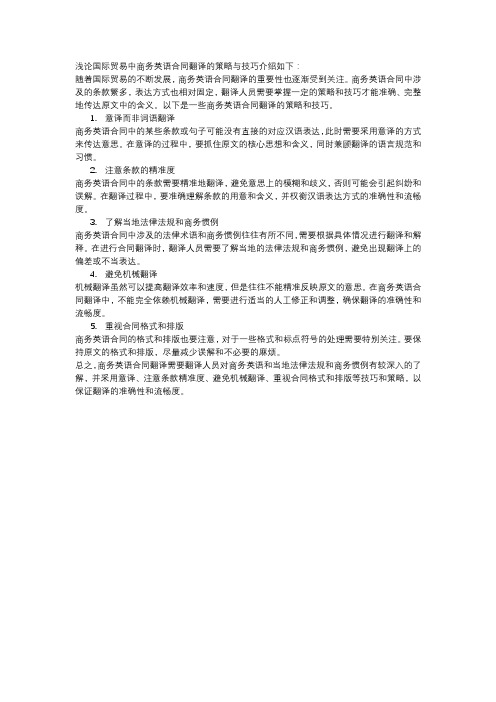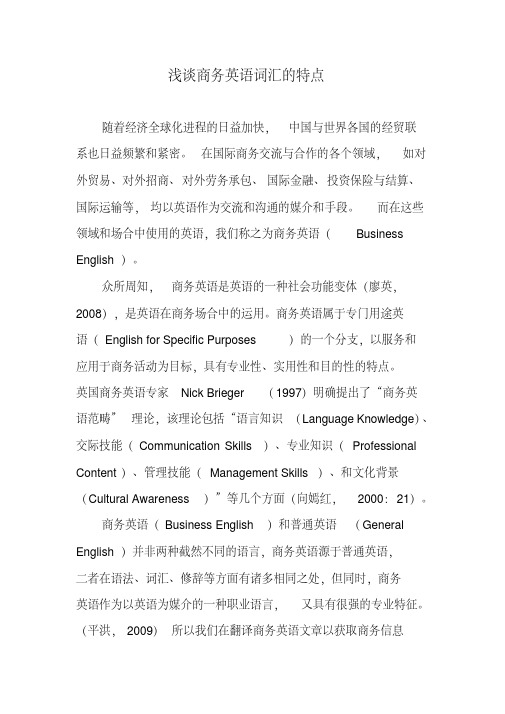商务合同论文-商务英语合同词汇特点和翻译技巧分析
- 格式:docx
- 大小:18.63 KB
- 文档页数:9

商务英语的特点及翻译技巧商务英语是一门应用型英语,其特点是实用性强、专业性强、精确性要求高。
商务英语的主要用途是在商业交流中进行信息的传递和沟通,因此其特点决定了其翻译需要具备一定的专业知识和技巧。
一、商务英语的特点1.实用性强:商务英语着重于应用,主要目的是为了满足商业场景下的沟通需求。
因此,商务英语注重实际应用,帮助人们进行有效的商务交流。
2.专业性强:商务英语的语言内容和技巧要求与特定的商务领域息息相关,因此需要对相关的商务知识和行业背景有一定了解,才能准确理解和翻译商务英语文本。
3.精确性要求高:商务英语的交流目的是为了准确传达信息和达成协议,所以对词汇的准确性和语法的正确性有较高的要求。
翻译商务英语时,也需要追求精确表达,避免歧义和误解。
二、商务英语翻译技巧1.深入了解商务背景:在进行商务英语翻译时,首先要对相关的商务领域和背景有一定了解,包括相应的行业术语、商务惯例和文化背景等。
这有助于准确理解和传达商务信息。
2.注重文化适应性:商务英语翻译需要考虑到不同国家和地区的文化差异。
在进行翻译时,要注意避免直译和文化冲突,选择适当的表达方式,以便更好地融入目标文化。
3.简洁明了:商务英语的目的是准确传达信息,因此要以简洁明了的语言表达,并避免复杂的句式和词汇。
翻译时也要遵循这一原则,尽量使用简洁的方式翻译商务英语文本。
4.准确性优先:商务英语对准确性要求高,因此在翻译时要注重准确表达。
避免直译、歧义和误解,保证翻译的准确性,以便确保信息的传递和商务交流的有效性。
总结起来,商务英语是一门实用性强、专业性强、精确性要求高的英语。
翻译商务英语需要具备一定的专业知识和技巧,并注重文化适应性、简洁明了和准确性优先。
翻译者应该深入了解商务背景,尽可能准确地传达商务信息,以达到有效沟通的目的。

浅论国际贸易中商务英语合同翻译的策略与技巧介绍如下:
随着国际贸易的不断发展,商务英语合同翻译的重要性也逐渐受到关注。
商务英语合同中涉及的条款繁多,表达方式也相对固定,翻译人员需要掌握一定的策略和技巧才能准确、完整地传达原文中的含义。
以下是一些商务英语合同翻译的策略和技巧。
1.意译而非词语翻译
商务英语合同中的某些条款或句子可能没有直接的对应汉语表达,此时需要采用意译的方式来传达意思。
在意译的过程中,要抓住原文的核心思想和含义,同时兼顾翻译的语言规范和习惯。
2.注意条款的精准度
商务英语合同中的条款需要精准地翻译,避免意思上的模糊和歧义,否则可能会引起纠纷和误解。
在翻译过程中,要准确理解条款的用意和含义,并权衡汉语表达方式的准确性和流畅度。
3.了解当地法律法规和商务惯例
商务英语合同中涉及的法律术语和商务惯例往往有所不同,需要根据具体情况进行翻译和解释。
在进行合同翻译时,翻译人员需要了解当地的法律法规和商务惯例,避免出现翻译上的偏差或不当表达。
4.避免机械翻译
机械翻译虽然可以提高翻译效率和速度,但是往往不能精准反映原文的意思。
在商务英语合同翻译中,不能完全依赖机械翻译,需要进行适当的人工修正和调整,确保翻译的准确性和流畅度。
5.重视合同格式和排版
商务英语合同的格式和排版也要注意,对于一些格式和标点符号的处理需要特别关注。
要保持原文的格式和排版,尽量减少误解和不必要的麻烦。
总之,商务英语合同翻译需要翻译人员对商务英语和当地法律法规和商务惯例有较深入的了解,并采用意译、注意条款精准度、避免机械翻译、重视合同格式和排版等技巧和策略,以保证翻译的准确性和流畅度。

商务英语的语言特点及翻译技巧一、商务英语的语言特征(一)词汇特点1.词义准确,用词精炼商务活动的客观实践性要求商务英语必须致力于对事实的客观描述,陈述事物时要做到具体、明确,绝对不能使用模棱两可、笼统抽象的词语,特别是对商业合同和法律文件。
商务英语常常使用词义比较单一的词,而不使用词义多样的词,如使用previousto或priorto代替before;还大量运用同义词或近义词的词项重复来保证用词准确性与严密性,比如:methodsandprocedures(途径)、Customfeesandduties(税费),等等。
此外,商务活动尤其追求时间效益,这就要求商务英语的措辞要尽量简明精炼,诸如公司内部的通知、联系客户的邮件信函等,用词都要讲究简练。
2.大量专业术语的使用商务英语以普通英语为基础,还包含国际贸易各个领域内的专业英语,诸如庞大繁杂的公式以及其他各类专业术语。
因此,商务英语的词汇必须包含众多规范化的专业用语。
比如:Marketeconomy(市场经济)、anti—dumpingmeas-ures(反倾销措施)。
此外,缩略词的使用是商务英语专业性强的突出表现。
缩略词的产生和运用,能够帮助解决商务英语中一些相对复杂的翻译难题,比如:L/C(信用证);D/p(付款交单)。
缩略语词义单一,简洁明了,既能保证规范,又可以节约时间,提高效率。
3.新词的产生与运用伴随着国际贸易的不断拓展,商务英语也在不断丰富发展着,主要表现为大量反映国际贸易的时展新趋势或先进技术等新词汇的出现。
这些新词汇大多属于复合词语,即按照特定顺序把几个词通过重新排列构成新的词汇。
比如当前信息时代背景下,产生了virtualstore(虚拟商店)、cy-bercash(电子货币)等新词汇。
新词的产生与运用赋予了商务英语更多的时代内涵,为其注入了新的发展活力。
(二)句法特点商务英语有着复杂且层次划分多样的句子结构,句式呈现出严谨、明朗的特征。

合同知识商务合同的语言特点及其汉英翻译商务合同是商业活动中至关重要的法律文件,它规定了各方的权利和义务,并对商业交易提供了法律保护。
在国际贸易中,汉英翻译的正确与否直接关系到合同双方的权益。
本文将探讨商务合同的语言特点,并探讨商务合同在汉英翻译中需要注意的问题。
一、商务合同的语言特点1. 精确性:商务合同需要明确、具体地规定各方的权益、义务以及商业交易的细节。
合同中的每个条款都应该精确无误,以防止不必要的争议和误解。
2. 一致性:商务合同必须在整体上保持一致性,不论是在用词上还是在句子结构上。
合同中的术语和定义应该一致,并且使用相同的语法结构来表达类似的内容。
3. 条理性:商务合同应该按照逻辑顺序组织,清晰地阐述各个条款和条件。
重要条款应该以明确的标题或者编号进行标示,以便于阅读和查找。
4. 严肃性:商务合同是一份正式的法律文件,必须以严肃、正式的语言来书写。
使用恰当的词汇和句式可以增加合同的权威性和可靠性。
二、商务合同的汉英翻译要点1. 词汇翻译:在商务合同中,有许多专业术语需要准确翻译。
翻译人员应该熟悉相关的行业术语,以确保翻译的准确性。
此外,还应避免使用歧义的词汇,以免产生误解。
2. 文体风格:商务合同既要准确传达法律信息,又要考虑到语言的简洁性和易读性。
在翻译过程中,应注意保持合同的正式风格,并可根据需要进行适当的调整,以符合目标语言的语言习惯。
3. 灵活运用:商务合同翻译不仅仅是简单的文字对应,还需要根据目标语言和文化背景的差异,适当调整句子结构和表达方式。
例如,中文合同中可能使用被动语态,而英文合同则更倾向于使用主动语态。
4. 格式要求:商务合同的格式在不同的国家和地区可能有所不同。
翻译人员需要注意确保合同的格式与原文一致,包括标题、条款号码、字体大小等。
此外,还需要注意格式中的特殊要求,如签字、印章等。
在商务合同翻译中,准确传达各方的权益和义务是至关重要的。
只有合同中的条款清晰明确才能保证商业交易的顺利进行。

商务合同写作:英语合同用词特点及用词专业性
英语商务合同的用词特点主要有以下几点:
1. 简洁明了:英语商务合同通常采用简洁明了的语言表达,尽量避免冗长的句子和复
杂的措辞。
合同中的用词应该清晰明确,以确保各方对合同条款的理解一致。
2. 正式专业:英语商务合同通常采用正式专业的用词,以确保合同的法律效力和权威性。
合同中使用的词汇应当符合法律要求,并具备明确的法律含义,避免歧义和误解。
3. 术语运用:英语商务合同常涉及到特定行业的术语和定义。
在撰写合同时,应根据
具体行业的特点和要求,运用相关的术语和定义,以确保对合同条款的准确理解。
4. 可操作性:英语商务合同的用词应具备可操作性,即合同条款应该具备可执行和可
操作的性质。
合同中的用词应该明确指明各方的权利和义务,并规定清晰的执行方式
和程序。
总之,英语商务合同的用词需具备专业性、准确性和可操作性,以确保合同的法律效
力和各方的权益。
在撰写合同时,应根据具体情况和行业要求,选择恰当的词汇和用法,以达到合同的预期目标。
同时,需要注意合同条款的语言表达要简洁明了,避免
使用过于复杂或晦涩的措辞。

浅谈商务英语词汇的特点随着经济全球化进程的日益加快,中国与世界各国的经贸联系也日益频繁和紧密。
在国际商务交流与合作的各个领域,如对外贸易、对外招商、对外劳务承包、国际金融、投资保险与结算、国际运输等,均以英语作为交流和沟通的媒介和手段。
而在这些领域和场合中使用的英语,我们称之为商务英语(Business English)。
众所周知,商务英语是英语的一种社会功能变体(廖英,2008),是英语在商务场合中的运用。
商务英语属于专门用途英语( English for Specific Purposes)的一个分支,以服务和应用于商务活动为目标,具有专业性、实用性和目的性的特点。
英国商务英语专家Nick Brieger (1997)明确提出了“商务英语范畴”理论,该理论包括“语言知识(Language Knowledge)、交际技能(Communication Skills)、专业知识(Professional Content)、管理技能(Management Skills)、和文化背景(Cultural Awareness)”等几个方面(向嫣红,2000:21)。
商务英语(Business English)和普通英语(General English)并非两种截然不同的语言,商务英语源于普通英语,二者在语法、词汇、修辞等方面有诸多相同之处,但同时,商务英语作为以英语为媒介的一种职业语言,又具有很强的专业特征。
(平洪,2009)所以我们在翻译商务英语文章以获取商务信息时,除了需掌握基本的翻译理论和技巧外,还应具备相关的商务领域的专业知识,如贸易、金融、运输、法律、保险等。
任何一门语言的最基本的单位都是词汇,只有准确理解了词汇的含义才能正确理解语篇的意思,从而准确获取所需的相关信息。
“语言的三大要素是:语音、词汇和语法。
词汇就像大厦的砖,不管什么样的大厦,都是一块一块用砖头砌起来的。
所以,词汇就像语言的最基本的材料,缺不得。

商务英语词汇的特点及其翻译1.专业性:商务英语词汇主要涉及商业领域的专业术语,如市场营销、财务会计、国际贸易等。
这些词汇具有一定的专业性和技术性,需要熟悉相关行业的知识和概念。
2.多样性:商务英语词汇涉及的范围非常广泛,包括合同、商业信函、会议、谈判、销售和市场活动等各个方面。
因此,商务英语词汇涵盖了大量不同的词汇类别和表达方式。
3.国际化:商务英语是国际商务交流的语言,因此其中的词汇更加注重国际化。
大部分商务英语词汇在不同的国家和地区都有相同或相近的表达,为跨国商务交流提供便利。
4.行业、地区和文化差异:尽管商务英语具有一定的国际性,但在不同行业、地区和文化背景下,商务英语词汇会有差异。
因此,对于不同的行业或地区来说,理解和熟悉其特定的商务英语词汇是非常重要的。
1.直译法:直接将商务英语词汇翻译成目标语言。
这种方法适用于词汇在不同语言中具有相同或相似的表达方式的情况。
2.释义法:根据商务英语词汇的含义和上下文,选择最适合的目标语言词汇进行翻译。
这种方法适用于商务英语中包含有专业术语或文化背景的词汇。
3.同义词法:根据商务英语词汇的意思,选择目标语言中与其意义相近的词汇进行翻译。
这种方法可以保持翻译的准确性并传达正确的意思。
4.描述法:通过描述商务英语词汇的功能、特点或用途,来传达其意义。
这种方法适用于目标语言中没有完全对应的表达方式的情况。
无论采用哪种翻译方法,翻译商务英语词汇时需要注意目标语言的语言规范和惯用表达方式,以确保翻译的准确性和流畅度。
同时,也需要充分了解目标受众的语言和文化背景,以便将商务英语词汇的专业意义传达给对方。


商务英语合同的词汇特点包括
1.正式和专业性:商务英语合同使用正式的语言,遵循一定的格式和
结构,以确保合同的法律效力。
合同中使用的词汇通常是专业性的,涉及
到商务和法律领域的术语,需要准确明确地表达合同各方的权利和义务。
2.精准和具体性:商务英语合同中使用的词汇需要具备精准和具体性,以确保合同条款的明确理解和执行。
各项合同条款和条件通常需要被明确
定义和解释,以避免合同争议和误解。
3. 法律性和约束力:商务英语合同涉及到法律领域,因此合同中的
词汇需要具备法律性和约束力。
合同中常用的词汇包括"shall"、"will"、"agreement"、"contract"等,以强调各方在合同下的权利和义务。
4.清晰和简洁:商务英语合同中的词汇应该具备清晰和简洁的特点,
以确保合同各项条款的理解和执行。
合同中的词汇应该避免模糊和歧义,
以避免合同纠纷的产生。
5.可操作性和执行性:商务英语合同中的词汇需要具备可操作性和执
行性,以确保合同的履行和实施。
合同中的词汇应该具备可行性和可解决性,以应对各种可能的情况和问题。
总之,商务英语合同中的词汇需要具备正式、专业、精准、具体、法
律性、约束力、清晰、简洁、可操作性和执行性等特点,以确保合同具备
法律效力和实际可行性。


商务英语合同的语言特征及其翻译在全球化的商业环境中,商务英语合同扮演着至关重要的角色。
它不仅是商业交易的法律保障,也是双方权利和义务的明确约定。
了解商务英语合同的语言特征以及掌握其准确的翻译方法,对于从事国际贸易、商务合作等领域的人士来说具有重要意义。
商务英语合同的语言特征首先体现在其准确性上。
合同中的每一个条款、每一个表述都必须精确无误,以避免可能产生的歧义或误解。
例如,在涉及到金额、数量、时间等关键信息时,往往会使用具体的数字和明确的单位,并且会采用精确的表述方式,如“not less than”(不少于)、“exactly”(确切地)等。
这种准确性的要求是为了确保合同的约束力和可执行性。
专业性也是商务英语合同语言的显著特征之一。
合同中会频繁使用专业术语和行业特定的词汇。
比如,在国际贸易合同中,常见的术语有“FOB”(离岸价)、“CIF”(到岸价)、“L/C”(信用证)等。
这些术语具有特定的含义和法律内涵,只有熟悉相关行业的专业人士才能准确理解和运用。
商务英语合同的语言通常较为正式和严谨。
句子结构复杂,多使用长句和复合句,以完整地表达复杂的法律关系和交易细节。
例如,“In the event that the Buyer fails to make payment within the stipulated period, the Seller shall have the right to claim damages in accordance with the provisions of this Contract”(如果买方未能在规定期限内付款,卖方有权根据本合同的规定要求赔偿损失。
)这种正式严谨的语言风格有助于增强合同的权威性和稳定性。
此外,商务英语合同还具有规范性和格式化的特点。
合同往往遵循一定的格式和模板,在条款的设置、顺序的安排等方面具有一定的规律。
比如,通常会包括前言、主体条款、违约责任、争议解决等部分,每个部分都有其特定的内容和要求。

商务合同英语的词汇特点与翻译策略商务合同是进行商业活动中至关重要的法律文件,常常需要涉及多国间的交易。
因此,对商务合同英语的词汇特点和翻译策略的了解对于确保其准确性和合法性至关重要。
本文将探讨商务合同英语的词汇特点,并提供一些翻译策略,以帮助翻译人员更好地应对商务合同的翻译工作。
一、商务合同英语的词汇特点1. 术语性词汇:商务合同涉及许多专业领域,例如法律、金融、贸易等,其中包含大量术语性词汇,这些词汇在合同中具有特殊含义,翻译时需要准确传达其专业含义。
2. 法律性词汇:商务合同是一份法律文件,因此其中会涉及大量法律性词汇,例如“合同条款”(contractual terms)、“违约”(breach of contract)、“解除合同”(termination of contract)等。
对于这些法律性词汇,准确的翻译至关重要,以确保合同的合法性和权威性。
3. 具体明细词汇:商务合同通常需要详细描述交易双方的权利和义务,因此包含许多具体明细的词汇,如日期、数量、金额、地点等。
在翻译这些具体明细时,需要特别注意准确传达源语言中的具体信息。
二、商务合同英语的翻译策略1. 专业词汇的翻译:对于术语性和法律性词汇,翻译人员需要具备相应领域的专业知识。
在翻译过程中,可以参考相关法律文书或专业词典,以确保所选用的词汇准确传达合同的专业含义。
2. 语境理解与转换:商务合同的翻译需要准确理解合同中的语境,并将其转化为目标语言中恰当的表达方式。
对于一些只存在于源语言中的法律条款或习惯表达方式,可以适当调整翻译,保留法律或贸易习惯,以便源语言和目标语言的双方都能理解。
3. 逐句审查与校对:商务合同的翻译容不得任何错误或模糊之处,因此在完成翻译后,翻译人员需要逐句审查和校对翻译的准确性和一致性。
特别关注术语和法律性词汇的准确性,并修复可能存在的漏译或翻译错误。
4. 正式语言的运用:商务合同是一份正式的法律文件,因此在翻译中需要使用正式、规范的语言表达方式。

商务合同英语的词汇特征与翻译要点探析随着商品经济的快速发展,商务合同成为商品经济的重要组成部分,伴随着商品经济的发展而发展。
商务合同属于一种规约当事人交易的手段,其语言要正式和严谨,要合格专业化的特点。
商务合同不但涉及了商务英语的内容,还涉及了一些法律英语内容。
所以,要准确的翻译商务合同中的专业词汇,减少涉外经济可能出现的合同纠纷。
商务合同的翻译不需要特别华丽的辞藻,需要的是语言的逻辑与严密,要客观、公证的表述文意。
1 商务合同英语的词汇特征1.1 正式用语的使用英语商务合同具备法律方面的效力,需要具备比较正式和规范的措辞,在词汇翻译的时候不能带有感情色彩。
因此,在英语商务合同中,不允许出现习惯性的口语化用法。
比如,“根据……”或者“按照……”,在英语商务合同中翻译要使用正式的用语,翻译为:“accordance with…”,而不能使用“according to…”。
合同中的“因为”,一般来说翻译为“by virtue of”,则很少使用“because of”或者“due to”。
同样的道理,在合同中,“事实上”翻译为“in effect” ,不能使用“in fact”。
在英语商务合同给翻译的时候,只有使用了一些正式的词汇,才能给商务双方人员一种权威感,也带来了一种确认感。
1.2 古体语的使用在商务合同翻译的时候,还会应用到一些古体词语,所谓古体词就是具备鲜明文体色彩的词汇成分。
但是在实际生活中的英语口语交际以及书面语言中基本很少使用这种类型的词汇,商务合同中使用这类词汇相对多一些,这就能看出商务合同的文体风格具备很强的庄重严肃性。
这跟商务合同英语文体具备的社会职能有着很大的关系,也凸显出了这个行业所具备的特殊性所在。
在商务合同英语中,一些比较常见的古体词很多是复合副词,比如,therein(in this在其中)以及thereto(to the thing mentioned 随附)等等。

英文商务合同论文英语商务合同的语言特点与翻译方法English Business Contract: Language Features and Translation MethodsIntroductionEnglish is the dominant language in the field of international business, and thus, English business contracts play a significant role in facilitating global trade. However, understanding and accurately translating these contracts can be complex due to their specific language features. This article explores the unique characteristics of English business contracts and provides insights into effective translation methods.1. Conciseness and PrecisionEnglish business contracts are known for their concise and precise language. The use of clear and specific terminology is crucial to avoid ambiguity and ensure mutual understanding between parties. Sentences are often structured in a straightforward manner, with minimal use of flowery or redundant language. This conciseness enables the contract to convey information efficiently and reduces the chances of misinterpretation.Translation Approach: When translating English business contracts, it is crucial to maintain the same level of conciseness and precision. Translators should prioritize accuracy and ensure that the translated version captures the original intent without introducing any ambiguity. Moreover, maintaining a clear and straightforward style will help ensure that the translated contract is easy to comprehend for all parties involved.2. Legal Terminology and JargonEnglish business contracts involve extensive use of legal terminology and jargon. These terms have specific meanings within the legal context and carry legal consequences. They often require precise translation to preserve their intended legal implications. Examples of such terms include "liability," "indemnification," and "force majeure."Translation Approach: When translating legal terminology and jargon, it is essential to have a deep understanding of both legal systems involved. Translators should conduct thorough research to identify the equivalent terms in the target language that carry the same legal weight. If no direct translation exists, explanatory footnotes or annotations can be added to ensure clarity.3. Conditionality and Precision in ObligationsEnglish business contracts frequently employ conditional language to specify obligations. This enables parties to outline the conditions under which certain obligations must be fulfilled. The use of precise language is crucial to avoid misunderstandings regarding the timing, extent, or triggering events of obligations.Translation Approach: Translating conditional language requires meticulous attention to detail. The translator must ensure that the conditions and obligations are accurately conveyed in the target language, including any specific requirements or triggering events. It is essential to maintain clarity and precision to prevent any misinterpretation by the parties involved.4. Cultural Considerations and International ApplicabilityEnglish business contracts are typically drafted with an international audience in mind. They aim to be culturally neutral and applicable across different jurisdictions. However, certain country-specific laws or cultural practices may need to be considered during the translation process.Translation Approach: Translators should possess a thorough understanding of both the source and target cultures to ensure accurate translation. They must research and consider any legal or cultural nuances that may impact the interpretation of the contract in the target language. Consulting legal experts from the target jurisdiction can also be beneficial to ensure compliance and address any potential conflicts.ConclusionEnglish business contracts have distinct language features that require careful attention during the translation process. Maintaining conciseness, accuracy, and cultural adaptability are essential for ensuring mutual understanding and effective communication between parties. By employing appropriate translation methods and considering legal and cultural nuances, translators can accurately convey the intent and obligations of English business contracts in the target language, thereby facilitating smooth international business transactions.。

浅谈商务英语中合同的翻译[摘要] 目前,中国的国际贸易、合作逐渐增多,这些商业活动都离不开合同,所以合同的翻译愈显重要。
本文从合同的定义入手,对其中词语及句子等主要几点的翻译做了简要分析。
[关键词] 合同翻译词语翻译句构特点及翻译引言中国在国际经济活动中越来越活跃,与国际的经济交往愈加频繁,这些经济活动都离不开合同,离不开法律条文的监管。
因此翻译合同等法律文件已成为当前研究的一门重要课题。
一、英文合同的定义在英文中,合同一般称为contract或者agreement。
1999年中国《合同法》第二条将contract定义为:a contract in this law refers to an agreement establishing, modifying and terminating the civil rights and obligations between subjects of equal footing,that is, between natural persons, legal persons or other organizations.据此,合同平等主体之间设立确定民事权利和义务的协议。
二、英文合同中词语的理解和翻译合同英语的用词极其考究,具有特定性。
在翻译的过程中应当特别注意以下几点:1.may, shall, must, may not (或shall not )may,shall,must,may not (或shall not)是再简单不过的词了,但它们在合同中的使用却需要我们极其谨慎。
may旨在约定当事人的权利(可以做什么),shall约定当事人的义务(应当做什么),must用于强制性义务(必须做什么),may not (或shall not)用于禁止性义务(不得做什么)。
may do不能说成can do,shall do 不能说成should do或ought to do, may not do在美国一些法律文件里可以用shall not do,但绝不能用can not do或must not do。


商务合同特点与翻译技巧论文商务合同特点与翻译技巧在商业活动中,合同是一种非常重要的文件,可以确保各方之间遵守协议,保证各方的利益。
作为一份法律文件,商务合同的翻译也需要法律专业人士进行翻译,以确保合同的合法性和真实性。
在翻译商务合同的过程中,需要注意以下几个方面:1. 双方的基本信息商务合同的第一步是确定合同的参与方,包括甲方和乙方的基本信息。
甲方和乙方的名称、地址、电话、传真和电子邮件等必须准确无误地列出,以避免出现翻译错误。
2. 各方身份、权利、义务、履行方式、期限、违约责任商务合同中需要明确双方的身份、权利、义务、履行方式、期限和违约责任等内容。
甲方和乙方需要明确各自的权利和义务,以确保协议的履行和解决任何可能的争议。
此外,合同还应明确违约责任和赔偿方式,以确保合同能够有效执行。
3. 需遵守中国的相关法律法规商务合同需要遵守中国的相关法律法规,在翻译时需要了解与合同相关的法律制度。
法律条款必须符合相关法律,并且必须遵守国际商务惯例。
4. 明确各方的权力和义务商务合同需要明确各方的权力和义务,包括商品或服务的交付、支付方式、保修条件、质量验收、知识产权等内容。
这些条款需要准确地翻译,以确保合同的有效履行和执行。
5. 明确法律效力和可执行性商务合同的翻译需要确保合同的法律效力和可执行性。
这需要特别关注合同中的条款是否符合国内外相关法律法规和国际商业惯例,以确保合同的具体实施和执行。
商务合同的翻译需要准确地表达合约内容和所有重要条款,以确保协议的执行和双方的利益。
翻译者需要具备良好的法律专业知识和语言能力,确保翻译的精度和准确性。
同时,对商务合同内容的理解也是非常关键的,必须保证翻译结果的合法性和可执行性,从而确保双方合法权益的得到保障。

10商务英语词汇特点及翻译策略
商务英语词汇具有以下特点:
1.专业性:商务英语词汇通常与商务领域相关,涉及商务活动、经济学、金融等方面的专业用语。
2.多样性:商务英语涉及广泛的商业活动,词汇涵盖了各种行业、市场、产品和服务。
3.实用性:商务英语词汇通常与商务交流和商业活动密切相关,具有实际应用的特点。
4.动态性:商业领域发展迅速,新的商务词汇不断出现,老词汇的意义也可能发生变化。
在翻译商务英语词汇时,可以采取以下策略:
1.对专业领域的深入了解:商务英语涉及多个领域,翻译人员需要对相关领域的专业知识有所了解,以便准确理解和翻译专业术语。
2.参考领域内的标准词汇:商务英语词汇通常有标准的翻译,可以参考相关行业的标准术语、词汇表和专业文献,以确保翻译的准确性和一致性。
3.根据上下文理解意义:商务英语词汇的意义常常依赖于上下文,在翻译时需要结合上下文进行准确理解和翻译,尤其是对于多义词、缩写词和专业术语。
4.考虑目标读者的背景:商务英语翻译需要考虑目标读者的背景和专业知识水平,选择适合读者理解的翻译词汇和表达方式。
5.不断学习和更新:商务领域发展迅速,新的商务词汇不断涌现,翻译人员需要继续学习和更新知识,以保持对商务英语词汇的准确理解和翻译能力。
Analysis on Word Features and Translation Skills in Business English Con tracts商务英语合同词汇特点和翻译技巧分析摘要随着全球经济一体化和中国与世界各国之间的经济往来的不断密切和加深,尤其是自从中国加入WTO以来,中国与世界各国的经济交流越来越密切。
在国际交流和贸易过程中,商务合同尤其是商务英语合同作为国际贸易与协作中约定双方权利与义务以及确立双方沟通方式的重要手段,其词汇特点和翻译技巧也越来越被更多的人加以研究。
本文试从商务英语合同的用词特色及翻译技巧等方面对商务英语合同的一些特点和翻译过程中值得注意的地方进行探讨和沟通,力求为从业者和研究者提供有益的借鉴和参考。
本文第一章重点分析了商务英语合同的发展背景、国内研究现状、研究意义等方面的内容,并详细介绍了商务英语合同在中国的快速发展情况;第二章交代了商务英语合同的概念和词汇特点, 并详细阐述了相关特点中专用名词、书面语、古体语、外来语、情态动词以及缩略语在商务英语合同中的使用情况;第三和第四章两章则从商务英语合同的翻译技巧和有利建议的方面进行了细致描述,并从古体词的准确翻译、专有名词的标准化翻译、公文的常用副词使用、易混词的专注度以及译本的规范和流畅方面重点阐述了相关翻译技巧。
通过以上分析,本文作者致力于将商务英语合同的特点和翻译技巧陈述出来,希望能够对以后的从业人员和翻译者的翻译和研究事业产生有利影响。
关键词:商务合同;国际交流;翻译AbstractWith the development of the economic globalization and the economic relationship between China and other countries becoming closer and deeper, especially China’s attendance of WTO, the economic communication between China and other countries becomes closer and closer. In the process of international communication and trading, business contract especially the business English contract as an important means of appointing two parties’ rights and responsibilities and setting up bilateral communicative ways in international trading and cooperation has been received more and more attention from the researchers. Business English words’ characters and translation principles and means has been brought into more and more people’s studying field.This thesis attempts to discover and discuss some features in business English contracts and the problems encountered in the process of translation from these aspects of business English contracts’words’features and translation skills wroth of noticing in order to provide the advantageous reference for the professionals and researchers. The first chapter of the essay lays stress on business English Contracts’ developing background, domestic studying situation, studying meanings and so on and introduce the rapid development situation of business English contracts; The second chapter depicts the concept of business Englishcontract and the words’ characters, meanwhile, it demonstrates the using situation of corresponding features including the technical term, written words, archaism, loanwords, modal verbs as well as abbreviations; The third and last chapter present every detail of business English contracts’translation skills and favorable suggestions, and the author demonstrates the translation skills from many skills like skill of accurate archaism, skill of regularized formal terms, skill of using conventional adverbs in official document, skill of paying attention on confusing words, skill of accordance with norm and fluency. Through all of the above analysis, the author devotes himself into depicting the features and translation skills of business English contracts so as to influence the future’s studies and translation professionals positively.Keywords: Business Contract; International Communication; TranslationI. IntroductionII. Words’ Features of Business English Contracts2.1 Usage of technical terms2.2 Usage of archaism2.3 Usage of written words2.4 Usage of loanwords2.5 Usage of modal verbs2.6 Usage of abbreviationsIII. Translation Skills of Business English Contract3.1 Skill of accurate archaism3.2 Skill of regularized formal terms3.3 Skill of using conventional adverbs in official document’s language 3.4 Skill of paying attention on confusing words3.5 Skill of accordance with norm and fluencyIV Suggestions in Business English Contracts’ Translation Process4.1 Being familiar with the related knowledge of business English4.2 Using the technical terms4.3 Understanding the words’and linguistic characters of business contractV. ConclusionWorks CitedAcknowledgementsI. IntroductionWith the development of economy and trading integration, business English as the basic communicative tool has been used widely in every trading cooperation. Contracts as the tool for different countries trading with others, has been brought into people’s discussion for a long time.Due to the oppositely conservative economic style and rare communication with other countries, the related study on business English Contracts was very rare before 21st in China. While the situation changed a lot from the beginning of the new era of 21st century with the booming development of related works.Business English contracts is a kind of text form with strong professionalism and responsibility. [1] To acquire business English contracts’words’characters and translation skills will be good for assisting related trading activities’communication and cooperation effectively and authoritatively. This paper aims at analyzing the character of words in business English contracts and the translation skills worthy of studying in order to help all of the students, professionals and related researchers of this field obtain a good knowledge of business English contracts, and also provide them with advantageous reference and assistance in their future’s study. What’s more, all of the related works’booming development will surely advance China’s marketing economic development and progress, prompt the blend of economy of China and other countries, which certainly will have extremely positive affection in world economic integrity.II. Words’ Features of Business English ContractsBusiness contract is the main guarantee of bilateral profits, its wordsshould be formal, serious, detailed, accurate, complex, profound and distinguished. [2] Thus in the process of signing a contract, related people have to adopt regularized terms and expressing ways to make sure the contract are coherent, its content is true and is with legal effect. In view of the above mentioned requirements, the words of business English contracts should have many characters, like the mass usages of technical terms, written words, archaisms, loanwords, modal verbs and abbreviations.2.1 Usage of technical termsTechnical terms in contract defines the words with specific meaning and character and being used not as common and ordinary meaning. On account of the legal effect, it always need many professional words, law terms to protocol an agreement in order to make the words’ meaning sole and specific without any emotional color and different meaning. There are many commonly used terms listed, like “for your reference”, “for one’s file”, “in your favor”, “by separate post”and “advance payment”and so on. [3]2.2 Usage of archaismThe massive use of archaisms is an obvious character of business English contract. For the language of business English is very formal with many written words, there are many words being used in documents and contracts rarely used in other fields. Archaisms are the words with formallanguage style, most of them are the adverbial compound words combined by propositions like there and here, where and by, after, in, at and so on. Just like the words “hereby”, “hereafter” and “whereby” and so on. [4]2.3 Usage of written wordsAs business English contracts should rule the two parties’rights, obligations, duties and action norms directly who signed the contract, therefore the written words are usually used to stand out the contract’s seriousness and professional textual characters. For example, “in effect”is always used to take the place of “in fact”; “desire to do” is always used to take the place of “wish to do”; “deem” is always used to take the place of “think” and “believe” and so on. [5]2.4 Usage of loanwordsSome business technical terms used in business contract originates from Latin or French, some are derived words or compound words by the root of them. Most of the terms have the same prefix or suffix and have the stable meanings being advantageous for expressing exactly. For example, “as per”comes from Greek; “inter alia”, “ad valorem duty”, “stare decisis”all originate from Lation, which will be written as italic type in business contract. [6]2.5 Usage of modal verbsThe purpose of signing a business contract lies in define twoparities’ rights and obligations in case of any legal dispute. Consequently, there existing lots of similar depictions in the items of a contract, like “something must be done”, “something may be done”and “something shall not be done”and so on. Under such circumstances, many modal verbs will be used in business contract. Apart from being used to express the future tense, some modal verbs have many other particular meanings in law, which could be paid more attention in translation process. To set some examples, “shall”commonly mean the obligation in business contract namely what should be done. And if it hasn’t been performed, such action will be seen as default. Thus “shall” means “should” or “have to”in the translation text; “May”commonly mean the right, power or privilege in business contract namely what can be done. And if expressing some right is mandatory, “be entitled” should be used usually; “Must” is generally used to express the compulsory situation by law namely what should be done, and the tone is stronger that “shall”; “Will” is generally used to express the compulsory situation without regulations in law, and the tone of it is weaker that “shall”. [7]2.6 Usage of abbreviationsAs kind of professional legal document, business English contract is tedious and complicated. And in order to make the contract convenient to be communicated, remembered and recorded, numerous abbreviations will be used in business English contract. The several simple liters usedin business contract can convey complex meanings, whose interpretations have become a convention internationally. In general, the payment way, delivery way, insurance way, price items, currency, measurement and other organizations, companies and countries always arise as abbreviations. For “LC”= letter of credit; L&D=loans and damage; L&D.=loans and discounts; FOB=Free on Board; A/R=all risks; SHINC=Sunday and Holiday Included etc,. [8]。